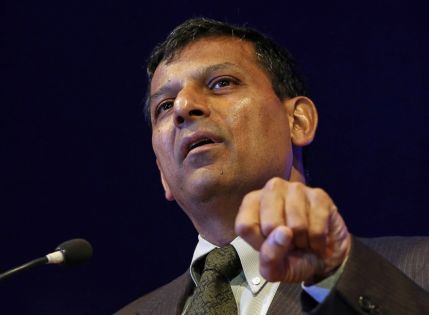Accusing some large borrowers of enjoying ‘riskless capitalism’, RBI Governor Raghuram Rajan said such entities were responsible for making banks' credit profile unhealthy and these big clients were in effect becoming 'freeloaders' in the banking system.
 Rajan also said it is the taxpayers and honest borrowers who end up paying the price for losses suffered by state-run banks due to bad loans given to a few big borrowers.
Rajan also said it is the taxpayers and honest borrowers who end up paying the price for losses suffered by state-run banks due to bad loans given to a few big borrowers.
A large borrower, whose loan has turned bad, should not be "lionised as a captain of industry, but justly chastised as a freeloader on the hardworking people of this country," the RBI Governor said.
The comments come in the backdrop of many public sector banks facing huge amounts of bad loans, mostly given to some big corporates while recovery process has been hanging fire in many such cases for months together.
Asserting that he is not against risk-taking, Rajan said in cases of any stress, the promoter threatens to run an enterprise to the ground, asking the government, banks and regulators to make necessary concessions to keep it afloat.
"We have to ask if our system of credit is healthy. Unfortunately, the answer is that it is not. The sanctity of the debt contract has been continuously eroded in recent years, not by the small borrower, but by the large borrower," Rajan said while delivering the third Verghese Kurien lecture at Institute of Rural Management in Anand, Gujarat.
In scathing remarks on the misuse of the system by the large borrowers, Rajan, who has earlier written a book titled 'Saving Capitalism from the Capitalists', said taxpayers and honest borrowers end up paying the price due to the excesses committed by large borrowers by way of losses to state-run banks and high pricing of loans.
"If the enterprise regains health, the promoter retains all the upside, forgetting the help he got from the government or the banks-after all, banks should be happy they got some of their money back!
"What I am warning against is the uneven sharing of risks and returns in enterprise, against all contractual norms established the world over-where promoters have a class of 'super' equity which retains all the upside in good times and very little of the downside in bad times," the academic-turned-central banker said.
Among various cases, the Rs 7,000-crore (Rs 70 billion) debt of Kingfisher Airlines has gone bad and total NPAs in the banking system coupled with restructured loans have crossed 10.4 per cent mark in the first half of this fiscal.
 Rajan acknowledged that there is a growing restlessness in the society about such reckless behaviour of corporates.
Rajan acknowledged that there is a growing restlessness in the society about such reckless behaviour of corporates.
On public perception that big borrowers are getting away due to "sweet deals" between the promoters and the bankers, Rajan sought to defend the lenders, saying they are rendered "helpless" while dealing with a large and influential promoter having many resources at command.
"The promoter enjoys riskless capitalism...When some businessmen enjoy a privileged existence, risking other people's money but never their own, the public and their representatives get angry," Rajan said.
This has resulted in laws being made more powerful, but small enterprises have suffered the most as a result of this, Rajan said.
He called for a more balanced and equitable system.
"The solution is not more draconian laws, which the large borrower may well circumvent and which may entrap the small borrower, but a more timely and fair application of the current laws," he said.
The RBI Governor underscored that it is the taxpayer who bears the brunt due to the large borrower's behaviour.
Stating that the large borrower is not a "helpless illiterate peasant", Rajan said, "When the large promoter defaults wilfully or does not cooperate in repayment to the public sector bank, he robs each one of us taxpayers, even while making it costlier to fund the new investment our economy needs."
On the hit to the honest borrower, Rajan used the example of how a loan to a power plant goes at a high 13.7 per cent interest, because of the risk premium which gets attached due to the bad behaviour of a few borrowers.
He also said that legal recourses available with banks like the DRT and Sarfaesi mechanisms are resulting in delays, sometimes due to the tactics of promoters, and called for some measures to change the scenario.
The government should expand the network of such institutions, train more people, use technology intensively, incentivise staff for early resolution, limit the number of 'stays' in a matter and can also consider having some monetary measures by way of penalties, Rajan suggested.
In FY14, banks could recover only Rs 30,590 crore (Rs 305.90 billion) through the DRT mechanism out of a total of Rs 2,36,600 crore (Rs 2.36 trillion ) sought to be recovered, Rajan said, adding backlogs in the tribunals, which are supposed to dispose of cases in six months, are growing.
The RBI Governor said the banks are paying a heavy price due to the procedural delays, saying by the time the business has been "stripped of value" and banks can recover only a "pittance".











 © 2025
© 2025